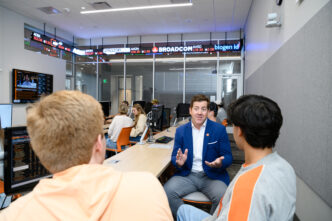For the past two years, the Wilbur O. and Ann Powers College of Business has organized a Research Seminar Series that features business research. This is an opportunity for research faculty to share their findings with other business faculty and the broader Clemson academic community.
This year, 12 different seminars took place, each addressing a critical topic in business research, including sustainability, cyber security and more.
Jennifer Siemens, associate dean of faculty excellence, says, “The research seminar series gives us a valuable glimpse into the exciting work happening across departments. It’s a great way to build awareness, spark connections, and strengthen the research culture here in the Powers College of Business.”
Scott Baier, acting associate dean of research, echoes her thoughts. “The seminar series offered faculty from across departments a valuable opportunity to learn about each other’s research—what questions colleagues are exploring, and the data and modern tools they are using to answer them. It also fostered new connections among faculty who might not have otherwise discovered their shared research interests.”
Research Seminar Series:
“How Deep Is the Labor Market for Female Directors? Evidence from Mandated Director Appointments”
Daniel Greene, Department of Finance
Greene’s study analyzed the impact of California Senate Bill 826, which mandated increased female representation on corporate boards. It finds that, despite a rise in female director appointments, their qualifications and market reactions remained consistent with control groups, suggesting no decline in quality or negative investor perception. The findings also imply that other states could similarly boost female board representation without compromising director quality.
“Achieving Sustainability through the Appointment of Chief Sustainability Officers: The Role of Marketing Experience and Managerial Discretion in Top Management Teams”
Pravin Nath, Department of Marketing
For his seminar, Nath discussed the importance of the top management team, specifically how the Chief Marketing Officer (CMO) contributes to the success of the Chief Sustainability Officer (CSO). Because sustainability initiatives require buy-in across the organization, the entire top management team (TMT) plays a critical role in how successful the CSO can be. The researchers’ findings found that TMT members with marketing backgrounds help CSOs improve sustainability only when discretion is high, and the type of discretion needed differs by role (CEO, CMO, or others).
Difference-in-differences for causal inference: A Stata-based framework for understanding what works
David Drukker, John E. Walker Department of Economics
This lecture was designed for researchers in all disciplines interested in enhancing their understanding of econometric analysis and its application to real-world data.
“Turnover Experiences in Public Accounting and Alumni’s Decisions to ‘Give Back’”
Nancy Harp and Derek Dalton, School of Accountancy
Harp and Dalton presented their research on turnover experience in public accounting. Their study examined how aspects of the exit phase (from initial thoughts of leaving to actual departure) influence former employees’ willingness to support their previous firm afterward (e.g., by recommending its services). Based on surveys from former accountants and current professionals, the study identifies key factors that cause turnover and highlights points where firms can intervene.
“The Effectiveness of the Influenza Vaccine in Children”
Devon Gorry, John E. Walker Department of Economics
Gorry shared his co-authored study which evaluated the effectiveness of influenza vaccination in reducing hospitalizations and deaths among elderly individuals using a regression discontinuity design based on the age-65 vaccination policy in the UK. Researchers found a significant increase in vaccination rates at age 65 but no corresponding reduction in hospitalizations or mortality.
“The Roles of Cyber Investments on Cybersecurity Breaches in the Digitalization Age”
He Li, Department of Management
Businesses’ extensive investment in digitalizing information assets and operations has significantly increased their cybersecurity risks. This calls for strategies to invest in cybersecurity protection effectively. Li’s presentation overviewed three studies the examined how firms’ cyber investments influence their cybersecurity breaches. The first study showed the heterogeneous effects of investing in different cybersecurity protection systems on internal and external breaches. The second study examined how a firm’s cloud storage implementation affects different types of security breaches in both the short and long term. The third study showed that not only how firms invest in cybersecurity but how they learn to invest matters.
“The Good, the Bad and the Ordinary: Estimating Agent Value-added using Real Estate Transactions”
Lily Shen, Department of Finance
Shen shared insights into her co-authored research paper. The authors’ findings suggest that homeowners who use a flat-fee broker (instead of a traditional real estate agent) and list on the MLS sell for 1–4% more on average before commission, typically take a few days longer to sell, but are less likely to complete a sale. Additionally, the paper examined how real estate agent effectiveness varies widely, with top-performing agents exhibiting characteristics such as delivering better results consistently over time, gaining more business as a result of their strong performance, and performing especially well in challenging (cold) markets when properties are harder to sell.
“Does Employment-based Health Coverage Impact Financial Reporting Quality?”
Babak Mammadov, School of Accountancy
Mammadov’s research into health insurance and its impact on financial reporting quality revealed that overall, better health insurance leads to better financial reporting. During his session, he shared his findings: Firms that offer employment-based health insurance, especially higher-quality plans, tend to have higher-quality earnings, fewer costly restatements and fewer internal control weaknesses. The paper also showed that health insurance reduces employee stress and improves job performance, and based on the conservation of resources theory, argues that access to good health insurance reduces stress for rank-and-file employees, improves focus, mitigates errors and improves information sharing within the company.
“A Generalize Hyperbolic Distance Function for Benchmarking Performance: Estimation and Inference”
Paul Wilson, John E. Walker Department of Economics
Wilson’s co-authored paper describes a multiplicative, generalized hyperbolic distance function that allows the researcher to hold a subset of inputs or outputs fixed. Statistical properties of both free-disposal hull and data envelopment analysis estimators of full efficiency, as well as estimators of order-alpha quantile partial efficiency and order-$m$ expected partial efficiency, are developed. The statistical results enable inference about efficiency in a wide variety of settings. An empirical illustration using data on U.S.~credit unions is provided, as well as Monte Carlo evidence on the performance of the estimators.
“The Term Structure of Lease Rates”
Ernesto Aldana, Department of Finance
Aldana’s research found that shocks first affect long-term leases, then pass through to short-term ones, with markets taking several quarters to absorb new information, suggesting inefficiencies fully. The researchers’ model clarifies rental market dynamics and quantifies risk and return, as demonstrated by evaluating a long-short leasing strategy used by coworking firms in the last cycle.
“Does News Coverage of ESG Violations Affect Brand Sales? An Empirical Analysis”
Serkan Akturk, Department of Management
Akturk shared his study, “Does News Coverage of ESG Violations Affect Brand Sales? An Empirical Analysis.” This line of research examines the effects of news coverage related to environmental, social and governance (ESG) violations on consumer purchasing behavior at a large U.S. retailer. Some of their findings include that news coverage of ESG violations negatively impacts brand sales at the retail level, and news coverage of negative environmental and governance issues is associated with increased purchases.
“Auditor Stress and Coping”
Erin Hawkins , School of Accountancy
Hawkins presented on a qualitative project, “Auditor Stress and Coping.” Survey data on stress and coping mechanisms was collected from practicing auditors. The theoretical framework and current findings from the initial data analysis will be presented to gather feedback on other ways to interpret the data.
The impact of technology in the marketing industry
Michael Giebelhausen, Department of Marketing
Giebelhausen shared key takeaways from several projects examining the impact of technology on customer experience, including AI and student experience. One project he shared was from a co-authored study that examined the customer experience with AI during “service encounters”, an exchange between a firm and customer.
“Family Medicine Meets the ED: How Co-location Reshapes Patient Flow and Acuity Mix”
Benjamin Grant, Department of Management
For his session, Grant presented his paper that explores how integrating family medicine offices within hospital campuses influences emergency department (ED) patient flow and acuity levels. His findings suggest that co-located primary care shifts patients with lower-acuity, or less severe or urgent medical needs, away from the ED, increasing the proportion of higher-acuity cases.
“Public Pensions and the Strategic Timing of Formal Employment.”
Jonathan Leganza, John E. Walker Department of Economics
Leganza’s research into pension eligibility rules influences labor supply decisions in Ecuador with co-authors Mariano Bosch, Tatiana Mojica, Maria Laura Oliveri and Diego Vera Cossio, analyzed administrative and survey data uncovers patterns in retirement spikes at eligibility ages and evidence of strategic transitions into formal employment at age 50. The findings provide insights into how workers navigate pension requirements and the role of family firms in informal-to-formal labor transitions.
Visit the Powers College of Business research page for more information.







